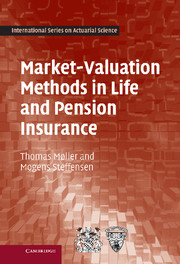Book contents
- Frontmatter
- Contents
- Preface
- 1 Introduction and life insurance practice
- 2 Technical reserves and market values
- 3 Interest rate theory in insurance
- 4 Bonus, binomial and Black–Scholes
- 5 Integrated actuarial and financial valuation
- 6 Surplus-linked life insurance
- 7 Interest rate derivatives in insurance
- Appendix
- References
- Index
5 - Integrated actuarial and financial valuation
Published online by Cambridge University Press: 13 August 2009
- Frontmatter
- Contents
- Preface
- 1 Introduction and life insurance practice
- 2 Technical reserves and market values
- 3 Interest rate theory in insurance
- 4 Bonus, binomial and Black–Scholes
- 5 Integrated actuarial and financial valuation
- 6 Surplus-linked life insurance
- 7 Interest rate derivatives in insurance
- Appendix
- References
- Index
Summary
Introduction
In the previous chapters it has been assumed that mortality risk is diversifiable. Under this assumption, we have proposed valuation principles which could be derived by working with a big portfolio of insured lives (allowing for deterministic decrement series) or by letting the size of the portfolio converge to infinity. In Chapter 2 the financial market consisted of one single investment possibility, a risk-free asset corresponding to a savings account with a deterministic interest. Chapter 3 considered the case where the interest rate is stochastic and derived formulas for the market value of the guaranteed payments that involved the prices of zero coupon bonds. Finally, Chapter 4 studied a financial market with two investment possibilities, a stock and a savings account, and demonstrated how the market value of the total liabilities (including bonus) could be determined for fixed investment and bonus strategies. This study led to explicit formulas for the market value of the total liabilities in two specific models: the binomial model and the Black–Scholes model under the assumption of no arbitrage and diversifiable mortality risk. In this case, the market value was defined as the amount which was necessary in order to hedge the liabilities perfectly via a self-financing investment strategy.
The main goal of the present chapter is to analyze the combined, or integrated, insurance and financial risk which is present in a life insurance contract, where the benefits are linked to returns on the financial markets.
- Type
- Chapter
- Information
- Market-Valuation Methods in Life and Pension Insurance , pp. 146 - 199Publisher: Cambridge University PressPrint publication year: 2007

